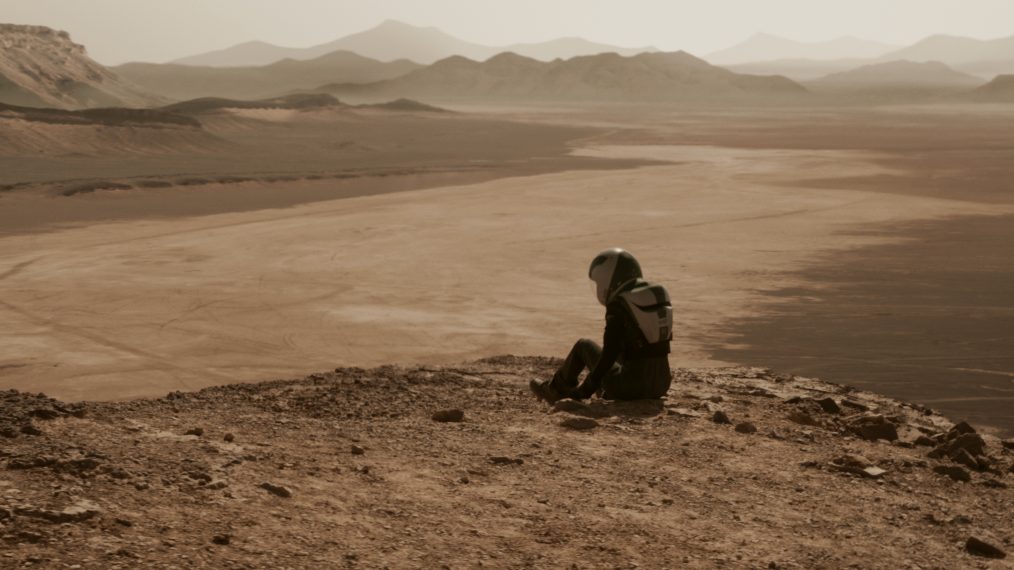Nat Geo’s ‘Mars’ Season 2: ‘Are We Doomed to Repeat the Same Mistakes We’ve Made on Earth?’

Preview
National Geographic’s groundbreaking documentary-drama hybrid MARS returns for a second season and continues to imagine what life will be like for Mars’ first inhabitants.
Fictional drama scenes starring an international ensemble cast — including South Korea-born musician Jihae, Argentine Alberto Ammann, Parisian Clémentine Poidatz, Romanian actress Anamaria Marinca, and Nigerian-born American actor Sammi Rotibi — are intercut with interviews with scientific big thinkers like Elon Musk, Neil deGrasse Tyson, Andy Weir (author of The Martian), former NASA astronaut Leland Melvin, theoretical physicist and futurist Michio Kaku, and Bill Nye, CEO of The Planetary Society. Both parts of the series explain how life in Martian territory is no longer an “if,” but a “when.”
Catch up on MARS Season 1 below:
“It’s not even sci-fi, because it’s grounded in reality, which I really dig,” says Season 2 showrunner Dee Johnson, who draws from her experience as a producer of ER to help explain complex scientific principles to laypeople. “The documentary elements help explicate these issues that we’re exploring so our characters don’t have to.”
Season 2 jumps five years ahead to 2042, when Mars has developed beyond a space outpost into a vibrant, fully-fledged colony called Olympus Town, and the scientific focus has shifted from survival to terraforming Mars into a more habitable planet with an Earth-like atmosphere. “They’re in a good place … and then the others come,” laughs Jihae.
Scientists are no longer the red planet’s only inhabitants. A crew of miners, funded by the for-profit corporation Lukrum Industries, is about to set up shop in the hope of monetizing Mars. But this phenomenon isn’t limited to MARS; exploitation following on the heels of exploration is a cycle that has been repeated throughout history, from the colonization of the United States to California’s gold rush to the current oil boom below the surface of the Arctic Ocean.
The focus of Mars’ inhabitants shifts to the interpersonal conflicts that arise once scientific hurdles are overcome and money is at stake. The result is a sophomore season that is as dramatic and dangerous as the surface of the Martian planet itself. Actor Jeff Hephner joins the cast as the leader of the Lukrum miners and shares, “A lot of great drama comes from when two different ideologies are put into this very confined space. They’re going to bump up against each other, and they’re going to have to learn to organize and function in that small space and with limited resources to make it work.”
“They want to stake a claim,” says Johnson. “And there is little that the people on Earth can do to police things happening on Mars. These people are kind of in the wild, Wild West.”
Esai Morales, who plays Lukrum’s Earth-based and silver-tongued CEO, explains that while science fuels exploration, commercial sustainability funds it. “It’s a symbiotic relationship,” he says. “Science develops the technology and the know-how that fuels capitalism, and capitalism funds the research and development that scientists need. It can be a real catch-22.” And he warns against viewing all scientific intentions as noble and dismissing those interested in profit as villains, saying, “People will either see the capitalists as robber barons or genius saviors. It’s just a matter of perception and perspective.”
As science and industry try to establish a peaceful, however uneasy, coexistence, interpersonal conflicts grow and issues like illness, death, contamination and the birth of the first Martian baby come into play. “Just because humans move to a different planet doesn’t change human nature,” says Johnson. “The underlying theme of this season is, are we doomed to repeat the same mistakes that we’ve made on Earth?” But despite the man-made drama that humanity is bringing to space, Mars may have the last laugh when it unleashes a life-altering natural disaster.
MARS, Season 2 Premiere, Monday, November 12, 9/8c, National Geographic










